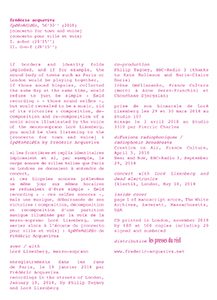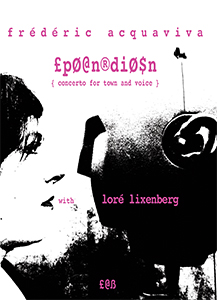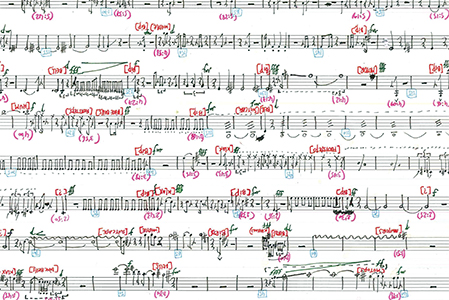If borders and identity folds imploded, and if for example, the sound body of towns such as Paris or London would be playing together, if those sound biopsies, collected the same day at the same time, would refuse to just be simple “field recording”—those sound selfies—, but would revealed to be a music, rid of its victories: composition, de-composition and re-composition of a sonic score illuminated by the voice of the mezzo-soprano Loré Lixenberg… you would be then listening to the [concerto for town and voice]: £pØ@n®diØ$n by Frédéric Acquaviva.
Recordings in the streets of Paris, January 19, 2018, by Frédéric Acquaviva.
Recordings in the streets of London, January 19, 2018, by Philip Tagney and Loré Lixenberg.
Frédéric Acquaviva, born in 1967, has been since 1990 a
sound artist and
experimental music composer, creating chronopolyphonic installations and CDs and playing in art galleries, in museums or in underground venues.
Staying away from traditional networks of musicians and composers, he meets and works with historical figures in art, poetry or video, sometimes a long time before their being discovered by the media. He has collaborated this way with
Isidore Isou, Maurice Lemaître, Marcel Hanoun,
Pierre Guyotat,
Jean-Luc Parant, mezzo-soprano
Loré Lixenberg, film maker
FJ Ossang and choreographer Maria Faustino, among others.
His astonishing music, in which he chooses an experimental presentation using, is constantly exploring, always in new ways, the relationship between voice and language, sound and its meaning, even the idea of physical body sounds integrated into the musical composition, kept away from the concert hall's diffusions (acousmatic or sound installations). As the critic
Eric Vautrin remarked in
Mouvement magazine, his work is not a “sound work but a work about sound”.
Acquaviva has become not only one of the essential protagonists of the rediscovery of historical avant-garde, more precisely of Lettrism (
Isidore Isou, Gabriel Pomerand, Maurice Lemaître, Gil J Wolman, Jean-Louis Brau, Jacques Spacagna,
François Dufrêne, Roland Sabatier, Alain Satié,
Broutin), but of
Sound Poetry (
Henri Chopin,
Bernard Heidsieck), and has worked with some unique and outstanding historical figures (Pierre Albert-Birot,
Otto Muehl). He has done this through his knowledge of and interest in different disciplines: editing books, curating art exhibitions, being an events creator, lecturing, establishing catalogue raisonnés and bibliographic databases, creating radiophonic works, being an art critic, a filmmaker, and a publisher, with Editions Derrière la Salle de Bains or for his own editions:
AcquAvivA, and the magazine
CRU.
See also
Yoann Sarrat : Phonosophie et corporalité compositionnelle – L'art sonore de Frédéric Acquaviva



